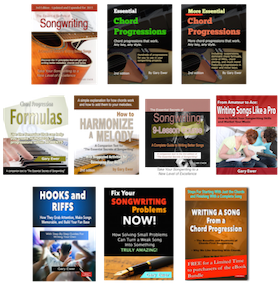Here’s a problem that I noticed in my own writing years ago, and I still battle today: Making sure that my newest songwriting ideas don’t sound the same as everything else I’ve written.
I suspect that most songwriters deal with this issue. We all have a kind of artistic “muscle memory” that keeps our fingers moving back to the same melodic shapes on the keyboard or guitar. Melodic shapes are only one part of the problem. You might also find that from one song to the next:
- you tend to favour the same tempos;
- you tend to favour the same keys;
- you find yourself writing about the same sort of thing;
- your songs all use a similar overall structure;
- you perform your songs using a similar vocal approach and style.
And it’s not easy to fix. You might think, “Just write something different,” but it’s not that easy. The way we write is governed in large part by our past musical experiences, and we all have our favourite go-to sounds and methods. So what do you do about it?
 Get the eBook Bundle package that’s being used by thousands of songwriters to polish their songwriting craft. “The Essential Secrets of Songwriting” 10-eBook Bundle covers every aspect of good songwriting, and comes with a free copy of “Creative Chord Progressions”
Get the eBook Bundle package that’s being used by thousands of songwriters to polish their songwriting craft. “The Essential Secrets of Songwriting” 10-eBook Bundle covers every aspect of good songwriting, and comes with a free copy of “Creative Chord Progressions”
Everyone has a personal musical style, and it’s not usually a problem. In fact, your sound and style are what helps to build your fanbase. If everything you wrote had a radically different cross-genre sound, you’d be having real problems building on that base.
But there is a way to make sure that your newest music sounds enough like you to satisfy your base without sounding like you’re simply re-doing old songs. Here are four thoughts to ponder for getting the balance right:
- Avoid consecutive songs that use the same tempo, key or performance style. This should be every songwriter’s aim. If your new song uses the same key, the same guitar-strumming backing rhythm, and the same tempo, then it almost doesn’t matter how original your melody is: it will sound uncomfortably like your previous songs, and your audience will think they’ve heard it all before.
- Listen to music from outside your chosen genre. It’s the best way to increase the pool of creativity from which you pull ideas to write new songs. If you’re not sure what to listen to, simply go to a search engine and type “best country songs”, or “best metal songs.” You’ll get enough music to keep you more than busy.
- As an exercise, try to write a song that sounds like someone else wrote it. Explore different bands or singer-songwriters (Leonard Cohen, Joni Mitchell, Adele, Foo Fighters…) and start writing. As you proceed through your process, keep asking yourself, “What would that songwriter do here in the song). Writing that way gives your creative brain licence to not always return to your own comfort zone, but to think outside the songwriting box. And no, that’s not plagiarizing. You’ll find that no matter what you do, as long as you’re not purposely writing pre-existing melodies or lyrics, it’ll still be you writing. And many famous songwriters actually do this.
- Write songs using different instruments as your starting point. If you feel most comfortable using a keyboard, you’re going to find that your fingers keep moving to your favourite positions. That’s a recipe for repetition. So even if you aren’t good with the guitar, pick it up and start noodling. You don’t have to be very good to use it as a tool for songwriting. And you’ll find a whole new set of musical gestures appearing under your fingers. Then move on to mandolin, cello, dulcimer — anything else that keeps your process fresh and new.
 Written by Gary Ewer. Follow Gary on Twitter
Written by Gary Ewer. Follow Gary on Twitter
 “The Essential Secrets of Songwriting” 10-eBook Bundle includes several ebooks dedicated to getting your chord progressions to work even better, including the very useful “Chord Progression Formulas”, which can help you create progressions in moments.
“The Essential Secrets of Songwriting” 10-eBook Bundle includes several ebooks dedicated to getting your chord progressions to work even better, including the very useful “Chord Progression Formulas”, which can help you create progressions in moments.











This is nice
Mr Gary thanks so much,thank God I found my self here..u just kind of my thoughts more reasonable.thanks alot..I want u to be my mentor….I have tried to sing but find it not to good doing that, whenever I have written a cool song..but just rapping..
Jeff I have also tried to deal with that in my mind too but ain’t easy but I off it,I can but I always want to is like disco, danceable….I love calm song but I can just c rapping is my spirit thing which am very good at….jeff it not like u can’t write that anymore,but u snap it of for some time,do something else more shareful
My writing obstacle these last several years has been my tendency to write songs about all that gone and going wrong in my life and I’m tired of it. I just write yet another woe-is-me song, and yet all my lyric ideas start with my problems as the premise. One friend suggested I go ahead and write yet another depressing song and then write its opposite. Might give that a try. For me, happy songs have always been so, so hard to write. My quest is to write something like good Vibrations, man, I love that tune.